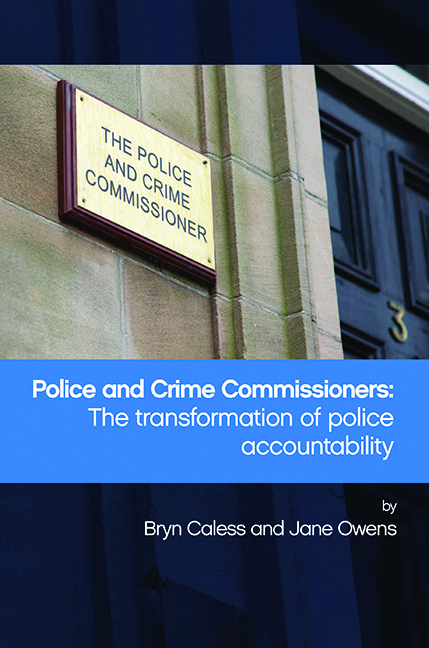Book contents
- Frontmatter
- Dedication
- Contents
- List of tables and figure
- Glossary of terms
- Acknowledgements
- Introduction
- one Governance: the Police and Crime Commissioner and police accountability in context
- two The psephology of the November 2012 election: motive, means and opportunity
- three Is the law on my side? Relationships between the PCC and the chief police officer team
- four Partners, colleagues or rivals for oversight? The (PCC) art of making friends and influencing people
- five “Putting yourself about”: PCCs, the media and the public
- six The debate with no end: PCCs’ remit and the problems of policing
- seven “I wonder if the game is worth the candle”: PCCs, their ‘work–life balance’ and their future
- General summary
- Bibliography
- Appendix Interview questionnaires
- Index
six - The debate with no end: PCCs’ remit and the problems of policing
Published online by Cambridge University Press: 01 September 2022
- Frontmatter
- Dedication
- Contents
- List of tables and figure
- Glossary of terms
- Acknowledgements
- Introduction
- one Governance: the Police and Crime Commissioner and police accountability in context
- two The psephology of the November 2012 election: motive, means and opportunity
- three Is the law on my side? Relationships between the PCC and the chief police officer team
- four Partners, colleagues or rivals for oversight? The (PCC) art of making friends and influencing people
- five “Putting yourself about”: PCCs, the media and the public
- six The debate with no end: PCCs’ remit and the problems of policing
- seven “I wonder if the game is worth the candle”: PCCs, their ‘work–life balance’ and their future
- General summary
- Bibliography
- Appendix Interview questionnaires
- Index
Summary
‘At the strategic end, the [police] had a one-dimensional view of the world and the possession of ideas, capability and the will to change was related too much to rank. You could only innovate if you had lots of silver braid: the problem was that once you got lots of silver braid, you didn't want to innovate.’ (Interviewee 57)
‘I think [the PCC] is the most switched-on ‘outsider’ I know. I like the clarity of his instructions, I like how well tapped-in he is to the communities and I like that he thinks all the time about how to make policing better.’ (CO11)
When the concept of the Police and Crime Commissioner took firm hold in Conservative thinking, the primary object, as we saw in Chapter One, was to ensure democratic accountability for the police, and to replace the ‘invisible’ police authorities. That original formulation appears to have grown; indeed, following the general election in May 2015, it is probable that, by 2018–20, the ‘PCC-as-oversight’ will extend to the other emergency services and possibly to other parts of the criminal justice system (prospects which we shall look at in greater detail in Chapter 7). In this chapter, however, we want to examine what the PCC's remit is and how it works, while also considering the impact of the PCCs’ involvement both in budget setting and in policing priorities and their sometimes fraught relations with Police and Crime Panels. We hope that this will give a picture (perhaps more truly ‘warts and all’ than the Home Secretary's claim in 2013) of the PCC's engagement with the problems of policing and the way in which the role has expanded from ‘democratic oversight’ into something much closer to strategising the (local) police and partners’ responses to crime.
The government stated at the outset that it did not want ‘to shackle Commissioners with reams of guidance and prescription on their role’ (Home Office, 2010, para 2.14) but suggested that ‘five key roles’ would be common to all. These were: representing communities’ policing needs, setting priorities to meet those needs, holding the chief constable to account, setting the police force budget, and hiring and firing the chief constable (Home Office, 2010, para 2.9).
- Type
- Chapter
- Information
- Police and Crime CommissionersThe Transformation of Police Accountability, pp. 153 - 182Publisher: Bristol University PressPrint publication year: 2016

